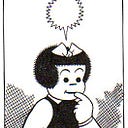Member-only story
Language
What I Like About American English
An open letter to our friends across the pond.

Dear Brits,
Great little country you’ve got there! Love your history, your literature, your Daniel Craig. And, of course, your language, which you generously shared with us North Americans when you crossed the Atlantic in those rickety little ships.
But may I speak candidly? We’ve had a few centuries to tinker with English, and, well, we’ve made some improvements. Trimmed a little here, changed some spelling there, preserved some useful traditions everywhere. You could learn a thing or two from us!
For example:
We cut out the U’s.
British English picked up the u in words like colour, armour, and savour from French couleur, armeure, and saveur, which came to the British Isles with the Norman Invasion. That was in 1066. By 1806, when Noah Webster compiled his the first “compendious” American dictionary, he dispensed with Frenchiness, paring down English spelling to its practical basics: humour became humor, draught became draft, plough became plow.
By the way, the peculiar British preference for Frenchy -ou- spellings is so strong that it’s given rise to faux-French spellings like neighbour (originally…
